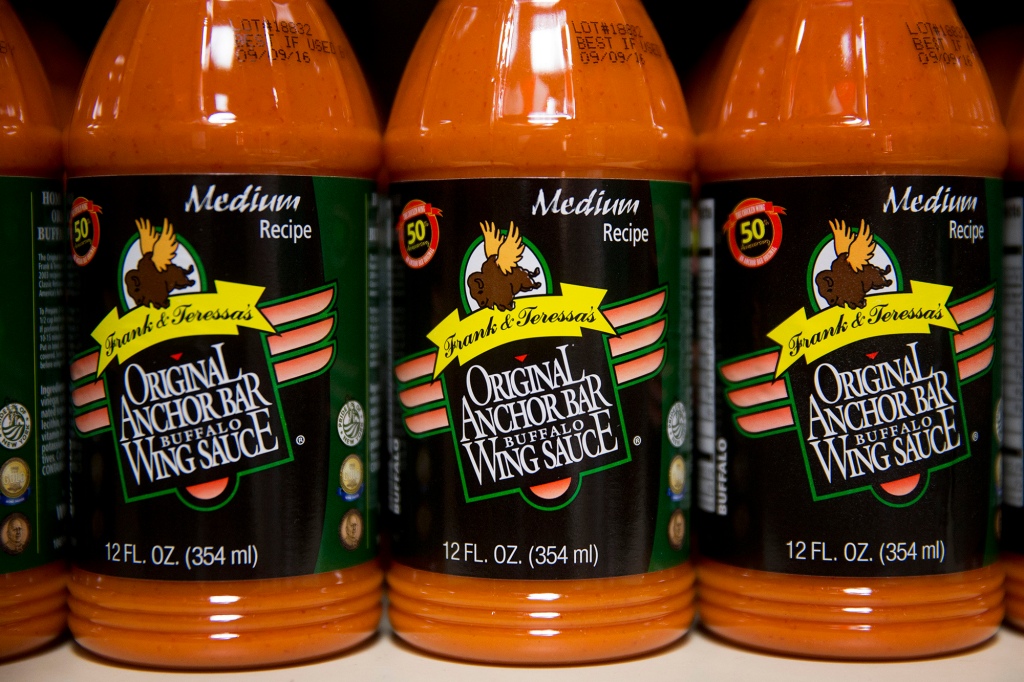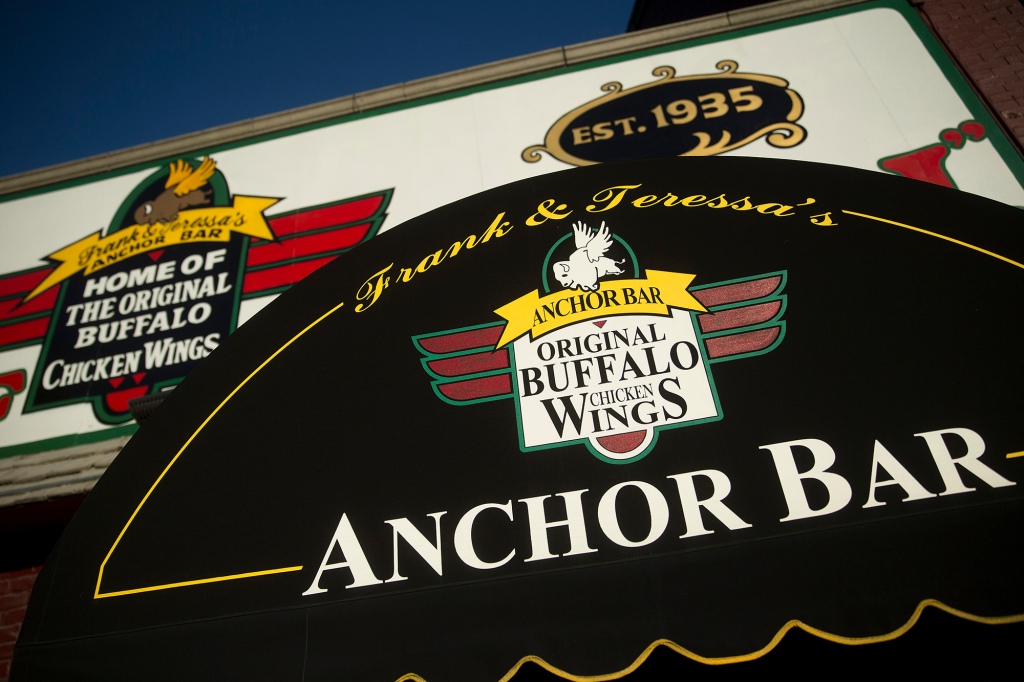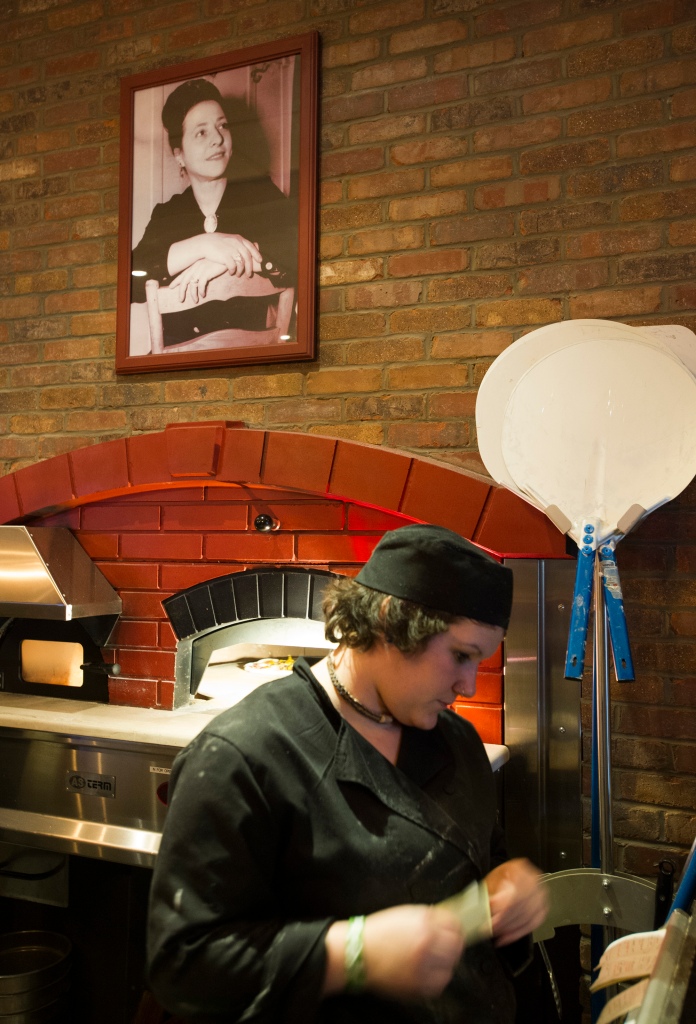Meet Teressa Bellissimo the creator of Buffalo wings who disrupted entire chicken industry
Poultry pioneer Teressa Bellissimo inspired a delicious all-American bar-food phenomenon.
The late restaurateur cooked the first batch of Buffalo wings, the most iconic of all barroom bites, by happenstance one winter night in 1964 at Anchor Bar in Buffalo.
Her invention soon upended an entire multi-billion-dollar sector of American agriculture.
The nation has delighted with teary eyes and sauce-soaked fingers ever since a small band of barflies savored those first bites of spicy chicken limbs in New York nearly 60 years ago.
Americans consume an incredible 27 billion chicken wings per year, according to an estimate by the National Chicken Council.
“There’s no doubt that her creation changed the course of American food history,” Buffalo History Museum spokesman Brian Hayden told Fox News Digital.
“Buffalonians take a tremendous amount of pride in our signature dish, one that has now been replicated all over the world.”
Chefs, consumers and food producers now flavor almost everything — from snack chips to cauliflower to ice cream — in Buffalo-style hot sauce. It’s a tangy red mixture of cayenne and vinegar sauce that’s blended with butter to temper the heat and create a smooth, savory mouth feel.
“Few cities in the world can claim that they have an entire flavor named after them,” added Hayden, author of the upcoming book, “111 Places in Buffalo That You Must Not Miss.”
Big Chicken has reaped the profits while often battling to meet the nation’s seemingly insatiable appetite for spicy, sauce-soaked chicken.
The moment that changed American culinary history
Teressa (Guzzo) Bellissimo was born in Sicily in 1900 and, with her husband Frank, opened a bar by the shores of Lake Erie in 1935 — hence the name Anchor Bar.
Later, it moved to its current Main Street location in 1940. It’s still thriving today.
Anchor Bar boasts 16 locations across the U.S. and Canada and is in the midst of franchise expansion. The original location attracts gastro-tourists from around the world.
Its moment that changed the course of culinary history came on the night of March 4, 1964.
“Dominic [Frank and Teressa’s son] was tending bar when some of his friends come in late at night,” Michelle Bucholz, operations manager for Anchor Bar today, told Fox News Digital.
“She was preparing food for the following day. At the time, they would take the wings off the chicken and just use them for soup or whatever.”
“Teressa decided, because she didn’t have anything else, that she’d deep-fry the wings. She made her own sauce and tossed the wings in the sauce. We always say the rest is history.”
“The guys liked them so much that the Bellissimos put them on the menu the next day,” reports the National Chicken Council in its history of the American barroom lore.
“Served with celery slices and blue cheese sauce, ‘Buffalo Wings’ were an instant hit.”
Chicken wings in the 1960s were considered peasant food — or even trash — noted Drew Cerza, dubbed “The Wing King” by chef Bobby Flay after beating the Iron Chef in a hot-wing throwdown at Anchor Bar in 2007.
The advent of Buffalo wings made chicken waste a chicken treasure. “Chicken wings became a profit center for the poultry companies,” said Cerza.

Americans became painfully aware of the tender dynamics of the chicken market during the COVID-19 pandemic, when our insatiable appetite for hot wings, and an inability to dine out, forced a dramatic spike in takeout and delivery orders.
Chicken wings were in high demand and short supply. Prices naturally skyrocketed.
“Restaurants like wing joints and pizza places were built around takeout and delivery, so they didn’t have to change their business model that much during the pandemic,” said Tom Super, spokesman for the National Chicken Council.
“Wings travel well and hold up during delivery conditions. Plus, they aligned with consumer desire for comfort food during the pandemic.”
The dynamics of pandemic dining put new pressures on an industry already struggling to meet the nation’s demand for chicken wings.
“Chickens only have two wings and producers need to sell the whole bird,” said Super. “So it simply isn’t a matter of raising more chickens to produce more wings. It’s a balance of demand and being able to sell not only the wings, but also the breasts, thighs, drumsticks, etc.”
The problem was compounded by a series of crises among producers and suppliers, making wholesale chicken wings more expensive than ever.
Stability has returned to the chicken industry here in 2022. But, like all other consumer sectors, poultry is being walloped by inflation, said John Henninger, a Buffalo native and co-founder of Dan & John’s Wings, a New York City-based collection of five hot-wing joints.

Henninger said he’s paying up to $3 per pound wholesale for chicken wings when he spent just 65 cents per pound in the years before the pandemic.
Consumers now pay up to $20 for just 10 Buffalo wings at eateries around the country.
It’s a far cry from the days, not that long ago, when 10-cent Buffalo wing promotions were common at American sports bars.
Buffalo champions marriage of pigskin and poultry
Buffalo wings in Buffalo are known simply as chicken wings, say local residents.
The city boasts more than its share of classic wing joints. Eateries such as Bar-Bill, Duff’s and Nine-Eleven Tavern challenge Anchor Bar for supremacy in the local wing scene.
But hot wings are ubiquitous, typically served alongside pizza at any takeout joint, even found at most grocery stores.
“Every kid in Buffalo grows up dipping his pizza in blue cheese,” said Henninger. Pizza and hot wings are typically ordered together as a family meal on Friday night — or, of course, on autumn Sundays while watching football.
Buffalo loves its NFL team just as much as its chicken wings. The two Western New York passions are intricately intertwined.
Cerza claims the success of the Buffalo Bills in the early 1990s, when they won four straight AFC championships, generated national attention for the region’s obsession with pigskin and poultry.
“Whenever they showed Buffalo fans getting ready for a big game, they were always eating chicken wings,” said The Wing King.
“Chicken wings became synonymous with watching football. It’s kind of like our participation sport in Buffalo. And that four-year playoff run really helped take chicken wings to the next level.”
The national chains took notice.
“The concept hit the big time in 1990, when McDonald’s began selling Mighty Wings at some of its restaurants,” noted the National Chicken Council.
“KFC rolled out Hot Wings a year later and Domino’s Pizza introduced its own wings in 1994.”
Americans still equate watching football with eating wings. We devour about 1.4 billion wings — about 5% of our entire annual consumption — on Super Bowl Sunday alone, according to the National Chicken Council.
Bellissimo’s legacy lives on today
Teressa Bellissimo died in her apartment above Anchor Bar on Nov. 4, 1985. She was 84 years old.
“While Mrs. Bellissimo was famous for her chicken wings, she was also admired for such dishes as squid marinara and veal scaloppine,” The New York Times reported in its obituary of the pub-food icon.
”My mother was a pure genius,” son Dominic Bellissimo, who tended bar that night in 1964, is quoted as saying.

”She could take a potato, a carrot, some peas, maybe a little onion sauteed, a little olive oil, throw in some little round meatballs and make you a meatball stew that would be the greatest.”
Dominic, the Bellissimos’ only child, ran the bar after their passing before he himself died unexpectedly in 1991.
Teressa Bellissimo’s legend lives on today in the nation’s obsession with spicy chicken, and in iconic local events such as the National Buffalo Wing Festival.
“Wing King” Cerza founded the event in 2002; it’s held each Labor Day weekend on the field at Highmark Stadium, home of the Buffalo Bills.
Buffalonians, and hot-wing lovers from around the world, eat up to 40 tons of chicken wings at the event in just two days, claimed Cerza.
“That’s a lot of angry chickens,” he said.
Read the full article Here


